|
FAQs about Marine Snail
Identification 13
Related Articles: Gastropods, Sea Slugs, Mollusks, Abalone,
Related FAQs: Snail ID
1, Snail ID 2, Snail ID 3, Snail
ID 4, Snail ID 5, Snail ID 6, Snail
ID 7, Snail ID 8, Snail ID 9, Snail ID
10, Snail ID 11, Snail ID 12, Snail
ID 14, Snail ID 15, Snail ID 16, Snail ID
17, Snail ID 18, Snail ID 19, Snail ID
20, Snail ID 21, Snail ID 22, Snail
ID 24, Snail ID 25, Snail ID 26, & Marine Snails 1, Marine Snails 2, Marine Snails 3, Invertebrate ID, Snail Behavior, Snail Selection, Snail Compatibility, Snail Systems, Snail Feeding, Snail Disease, Snail Reproduction, Mollusks, Sea
Slugs, Abalone,
|
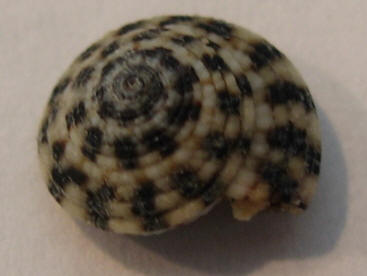
|
|
Snail Id's: Babylon and possible Limpet -
12/6/07 Hi Crew, <Hi Russ> Great site you've got
going on here, <On behalf of Bob and everyone here, I thank
you!> and, as you people seem to be the font of all marine
knowledge, I'm here to ask a couple of (hopefully not too
dumb) questions about some snails I've got. <Heee, no
worries there my friend - ask away!> First up, I bought some
Astreas from the LFS the other day (they were sold as Turbos, but
as they can't self right, I'm guessing I have been had),
and a couple of 'Nassarius'. <Unfortunate. The
incorrect labeling was most likely unintentional, but it serves
as a reminder for all of us to confirm exactly what we're
getting before bringing it home. Thankfully, most stores offer a
selection of books that can aid in this. If they don't, and
you're the least bit unsure, don't buy. LOL Just step
away from that tank! The best thing to do is go home, figure out
what it is and whether you can provide for its needs. Just doing
this one thing could save many, many, lives, and so much
frustration! Okay, I'm stepping off my soap box -- for now,
anyway! ;-)> One of the Astreas had a 'growth' on its
shell, which I noticed was moving, so I pulled it off to discover
it was a snail of some sort, and was wondering if you could ID it
- the photos show it in situ on the snail, and then on the glass.
Its got a real odd shaped shell. <<snail1.jpg>> >
> <<snail2.jpg>> <Unfortunately, I can't
see the shell well enough to Id. My first thought was that it
might be a Nerite, but the shot taken from underneath indicates
otherwise. The margin shouldn't be sharp like that all the
way around. One end of the shell should be curled/extending
underneath. Without additional photos (top view and any view that
would show whorls/lack of, etc), I'm going to guess that
it's a species of limpet. Not all have the classically
pointed cone shape.> Secondly, I'd like to ask if you
could ID what I believed to be Nassarius <Is similar, but not
in same genus.> - they are beautiful <Indeed!> but I
can't find a reference to anything like them on the web. They
do live under the substrate and show only their siphon, but it
seems they may be a bit on the large side for Nassarius vibex -
any ideas would be gratefully accepted. <The color pattern,
and the deep suture along the whorl, give it away. Its common
name is a Babylon shell (genus Babylonia), and depending on where
you look, is either in the family Babyloniidae or the family
Buccinidae. Taxonomic flux/synonyms drive me nuts! I won't
even go into it here because it would take up way too much space,
but suffice it to say that this little guy is grouped in with
whelks (predatory/scavenging snails) and I wouldn't trust it.
Please see these links for comparison/related info:
http://www.gastropods.com/Taxon_pages/TN_Family_BABYLONIIDAE.html
http://www.reefkeeping.com/issues/2005-11/rs/index.php > What
would you recommend in terms of keeping or returning these?>
> <<snail3.jpg>> <Need to know what other
inhabitants are in the tank/conditions therein. If you have a
full blown, mature, reef tank, the Astreas should be okay with
enough available food (just keep an eye on them). As for the
limpet (tentative Id), it could go either way. Some are
harmless/innocuous grazers, while others are capable of putting a
serious dent in your coralline, or even your corals! Not too long
ago, I caught one on my favorite Blastomussa wellsi! Last, but
not least, the Babylonia spp. Of the three snails, this would be
my biggest concern. Not only, because of its possible predatory
nature, but because I can't find any information on its
needs. For example, it might not even be suitable for the warmer
temperatures of our reef tanks. It's not unusual to see
snails sold online/locally that are from more temperate regions.
Snails such as this live an accelerated life - surviving for a
brief period, then dying. Hopefully, that is not the case here,
but I honestly don't know. I think it comes down to what
Dirty Harry said: 'Are you feeling lucky?'. Personally, I
don't like the odds. That snail would have to go!> Many
thanks for your help <You're very welcome.> Russ
(Sheffield, UK) - resent with capitalized 'I's :-)
<Much appreciated :-) Take care -Lynn (Seattle, USA)
|
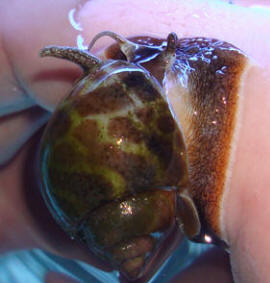 .jpg) |
|
.jpg)
|
Nuisance Snail: Coralline Eating Limpets! --
12/6/07 <Hi there!> I have been researching your website and
I cannot seem to locate my answer. I am looking for the name of a
nuisance snail that eats coralline algae. <Das ist Limpet! Ever see
the movie with Don Knotts? Never mind, I'm showing my age!> I
have at least 50 or 60, maybe more of these very tiny snails with a
very tiny cone shape eating away at coralline algae on the glass of my
tank. <Yowza!> While I appreciate the glass cleaning, I am afraid
my rocks and corals may be next. <Understandable. Limpets can be
voracious/full time grazers, and some species can/do eat coralline. I
would reduce their numbers by scraping them off the glass with an
appropriate algae scraper/razor blade and suctioning them out. Limpets
can be rather difficult to remove (hence the term 'Clings like a
limpet.'), but since these are apparently very small, it should go
a little easier. By the way, if you have an acrylic tank, I would
instead recommend using something like an old credit card (or an
existing one if you want to put it to its best use!) Good luck and take
care --Lynn>
Black Slug... actually is a snail... Scutus spp
12/03/2007 I found this in my tank and thought I would share
the photo. <Thank you for sharing!> I did some research and
found the slug to be (Scutus sp.) <Actually is a snail, not a
slug.> Order: VETIGASTROPODA Superfamily: FISSURELLOIDEA Family:
Fissurellidae. <Yes, more here:
http://www.seaslugforum.net/factsheet.cfm?base=scutus > Our slug
is about 2 1/2 inches and may grow to 5 inches in length. This is a
nocturnal slug and I found it by mistake a few weeks back. <Well
you found it nonetheless.> Just wanted to share. <Thanks
again!> Have a great day, Lis
<Thanks Lis, you as well! Mich> |
|
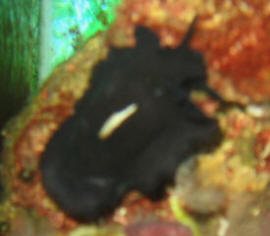 Well done Mich/Mitch... RMF. Well done Mich/Mitch... RMF.
|
|
Can you ID this snail 'The good, The
Bad and The Ugly!! 11/30/07 Hello Bob and WWM
Crew, <Hello Jerry, Mich here, apologizing for the long
delay... This ID has really got me stumped, and I have been very
stubborn in not wanting to give up.> Just found a few of these
guys in my tank, they only come out at night. <I initially
thought this was a Nassarius snail, but I've never heard or
seen any that are red.> The body of this snail is a bright,
bright red. The shell is a white/tan with brown to black
markings. Almost looks like a tiny Conch shell. Really tiny about
half a thumbnail. <Yes, the shell appears very conch-like.>
I have also recently found a row of snail eggs in a hard
transparent bubble casing on my glass. If these guys are the bad
guys, I want to start picking and remove the eggs if it's
from them. I was hoping they were from my Turbos, but then I
found these guys.. <OK> Sorry for the photo being so bad. I
will send another right behind it, maybe a side view. <I see
the photos, but am still stumped.> Thanks, <Welcome,
Mich> Jerry
Snail ID...The Good the Bad the Ugly follow up, Maybe Tulip
Snail? 11/30/2007 Hello Bob and WWM Crew, <Hello Jerry,
Mich with you again, frustrated that I am not able to help you
more.> After another day of reading on your website...I think
it may be a Tulip Snail. <To me the shell does not generally
look consistent with a Tulip snail. Most of the Tulip snail
shells that I have seen are rather smooth. Of any tulips sail
shells I've seen, the shell resembles that of Fasciolaria
lignaria but I'm not finding much information and have been
unable to even find an image of a living snail of this
species.> I finally found a pic that looks like the snail I
have. <I see this.> Would you agree? <The pictures look
consistent with what you sent, but wish you had sent the link to
the website where you found this. I have been unable to find
anything that I feel is a match.> Sorry for the previous
photos being so blurry. <Look for a Macro feature on your
camera, it will help you get focused close up shots.> The
female laid another batch of eggs on the glass, if I scrape them
off and some were to fall, would they have the ability to hatch
later? <Likely so.> The casings are very hard, transparent
and really attached, so scraping seems to be my only alternative.
The critters inside are getting bigger and I would hate for an
infestation. <Yes and some Tulip snails are predatory. So it
would be good to determine it this ID is correct.> (there are
maybe 10 per sac and maybe 20 sacs on the glass). Bummer, my son
and I were really looking forward to watching them hatch.
<Sorry.> Any suggestion for removal, without spreading them
around the tank? <Likely manual removal, with a siphon hose
close behind to remove any strays would be best.> Attached are
the Eggs and the photo I found on your site of the snail..
<ARGH! I can't even find this image on our website. I am
so sorry that I have not been much help with this query. You sure
have me stumped. Thanks, <I again apologize, Mich>
Jerry
Snail ID...The Good the Bad the Ugly follow up,
Maybe Tulip Snail? 12/03/2007 Hey Mitch, <Hi Jerry, Mich
with you again.> Thanks for the response.. <Welcome!> I
figured because of the Thanksgiving holiday you guys probably had
an overload of catch-up!! <Yeeaah... I'll go with
that...> Anyways I did some more research and I think I have
our guy!! I am sure you have it just a little bit harder
considering the blurry photos.. <They were a bit fuzzy...>
and thanks for the macros idea on the camera I will try that the
next time!! <Please do.> Here is a link and I just chased
it wherever it took me..
http://www.reefkeeping.com/issues/2004-07/rs/index.php I believe
it is a Columbellids.. <Well my fellow crewmember Brenda gave
me this link before I sent out my response:
http://www.projectdibs.com/forums/showthread.php?t=29 But I
thought the shell looked to smooth compared to the pics you sent.
I never saw anything hat I felt was a good match. But when this
was posted on the daily page RMF commented that he thought it was
a tulip snail.> With your eye do you think it's a match?
<Is very hard to tell with the fuzzy pics.> I was just
never able to find out if it has a red body or not? <I am
unsure.> Anyways thanks for all your help, <Welcome, but
don't feel I was much help here.> Can you imagine what all
the tanks would look like, if guys <and gals> like you at
Wet Web Media were not around and we were only left to the LFS
advice!!! <Well there are some very knowledgeable LFS and
there are some that aren't...> Thanks <Welcome again,
Mich>
Jerry
|
|
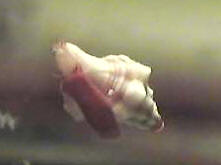 A tulip... A tulip...
|
|
ID help for others... Sundial snail (Heliacus
sp.) 11/25/2007 Hi Crew, Chris here again. <Hi Chris, Mich
with you tonight.> I believe I have ID'ed this as a
sundial snail from what I've seen on the ID pages. <Does
look to be so, but the pagoda shaped operculum (trap door) would
really confirm this as a Sundial snail (Heliacus sp.)> I just
wanted to send these pictures to help others as I did not find
any pictures as clear as these anywhere in the FAQ pages.
<Thank you for sharing. Always appreciated. Mich>
Re: ID help for others... Sundial snail
(Heliacus sp.) 11/25/2007 I was thinking that the picture
attached showed the pagoda trap door. <You are correct. This
picture shows the white pagoda/cone shaped trap door (operculum)
quite well.> If not please let me know. <No, you are right.
I see you included this pic in your first email, but somehow I
only saw the other image. My apologies.> I'm trying to
learn as much as possible about as much as possible as fast as
possible. <You appear to be well on your way.
Cheers,
Mich>
|
|
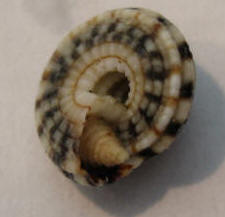 
|
|
Question about a Snail? -baby Scutus? 11/11/07 Hi Bob and
team, <Hi, Sara here tonight/morning-- whatever it is now.
lol> I know people say it all the time, but you guys run a
great site. It's been very helpful for me as I'm new to
the whole saltwater experience, but so far things have gone well.
<fabulous> Have learned some lessons the hard way, but
those are mistakes you won't make again any time soon, and
luckily my losses are minimal with a 15 gallon tank. Onto the
question. I recently got some more corals for the tank and on one
of the rocks was a hitchhiker. I picked it off and watched it for
a while. At first I thought it was a slug, and then after some
reading have settled on the fact that it's most likely a
snail. It's characteristics are as follows (for anyone else
searching the way I do) - All Black with a white under belly -
Two prominent tentacles near the head - Weird to explain it this
way, but it kind of looks like a cracked egg. The yolk is really
a black shell, which is raised higher than the rest of the body,
and then has a more flat "egg white" around its body
(also black). - A bit smaller than an eraser head From reading
through your site and others I can find only two possible
identifications for it: a Scutus, or a Black Stomatella Snail
<bingo>. If it's a Scutus it's supposed to have a
white mantel, which I can't see but it comes closest to what
I have seen online, and it's the one I'm leaning towards.
<Initially after seeing the picture, this is what I thought
too. However, the Scutus have white/off-white shells which are
veiled in black tissue. The shell of the Scutus is
"buried" under thin black tissue over the top of the
snail. If the shell of your little dude is exposed and black,
that makes me think it's a Stomatella. So, are you sure the
shell itself is black? or is there a white shell under the black?
If it's a Scutus, it will show the under lying white shell if
you just gently poke its back. In any case, please do cherish
him/her. Both types of gastropods are excellent aquarium animals
and also really cute (in my opinion).> It looks similar to
<http://rfbolland.com/okislugs/scutungu.html>
http://rfbolland.com/okislugs/scutungu.html There is no sense on
how big that one is. I have also attached a picture. But probably
isn't good enough for a formal ID (All new aquariums should
come with manual focus cameras). As far as the idea of it being a
Black Stomatella, I couldn't find any pictures online and
very little info, so I'm thinking it's probably less
correct. My big question (of course) is should I put it into my
tank? <absolutely> Last think I want is something eating up
my corals, but if it's a Scutus it's an algae eater then
it should be safe. Your thoughts? <Well, I'm probably
about 98% sure it's a Stomatella or Scutus, but I can't
honestly commit to one or the other from your picture. If you get
a better shot of him, feel free/encouraged to send this in.
:-)> Thanks Mike <Best, Sara M.>
Question About a Snail? ...Scutus sp. Mich's
go 11/11/07 Hi Bob and team, <Hi Mike,
Mich here.> I know people say it all the time, but you guys
run a great site. <Thank you for these kind words.>
It's been very helpful for me as I'm new to the whole
saltwater experience, but so far things have gone well'¦
<Glad to hear.> have learned some lessons the hard way, but
those are mistakes you won't make again any time soon,
<Often we can learn from others mistakes, but sometimes we
have to experience things for ourselves.> and luckily my
losses are minimal with a 15-gallon tank. <Tis good.> Onto
the question. I recently got some more corals for the tank and on
one of the rocks was a hitchhiker. I picked it off and watched it
for a while. At first I thought it was a slug, and then after
some reading have settled on the fact that it's most likely a
snail. Its characteristics are as follows (for anyone else
searching the way I do) - All Black with a white under belly -
Two prominent tentacles near the head - Weird to explain it this
way, but it kind of looks like a cracked egg. The yolk is really
a black shell, which is raised higher than the rest of the body,
and then has a more flat 'egg white' around its body
(also black). - A bit smaller than an eraser head <Ok.> I
have seen two descriptions for this. First, some say it is a
Scutus, but someone else indicated it could be a Black Stomatella
Snail. If it's a Scutus it's supposed to have a white
mantel, which I can't see <Is usually hidden under a flap
of skin so may be difficult to view.> but it comes closest to
what I have seen online, and it's the one I'm leaning
towards. <I am in agreement here. I am wondering if it has a
snout? See here:
http://www.seaslugforum.net/factsheet.cfm?base=scutus > It
looks similar to http://rfbolland.com/okislugs/scutungu.html I
think, but there is no sense on how big that one is. <Text
below the image says 43 mm> I have also attached a
picture 'but probably isn't good enough for a formal
ID. <Mmm, is a bit blurry... Do you have Macro feature on your
camera? (The symbol often resembles a flower) Using this feature
will allow you to get a clearer, close up shot.> Hoping that I
get a new camera, SLR, with manual focus so I can take pics of my
tank. <Know the feeling, am longing for a DSLR myself.> As
far as the Black Stomatella goes. I couldn't find any
pictures online and very little info, so I'm thinking
it's probably less correct. <Me too. I have never seen a
Stomatella that was this dark... that's not to say they
can't be... just speaking from personal experience here.>
My big question (of course) is should I put it into my tank?
<If it were me/mine. I would.> Last think I want is
something eating up my corals, but if it's a Scutus it's
an algae eater so less worry. Your thoughts? <I say keep it
and enjoy it!> Thanks
<Welcome! Mich>
Mike
|
|
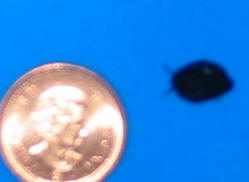
|
|
Worms!!! Help!!! 10/27/07 Hello, I'm
having a huge problem with a tube worm "tubiculous
Polychaete"? <That's actually not an animal name.
It's an adjective put before a descriptive noun. Basically,
it's just a fancy way of saying "tube worm."> It
started out as two that where in my tank for a couple years. They
were really cool at first, never multiplied or disturbed
anything, just cast a silk line out every now and then and would
reel in various things that floated by.? <They sound like
Vermetid snails. They're actually not worms. Please see here:
http://reefkeeping.com/issues/2005-01/rs/index.php> Suddenly,
after all this time, they have started multiplying exponentially.
I've literally got hundred of them and there silk is
bothering corals and making the tank look nasty. <They're
probably not bothering the corals, but they can be aesthetically
unpleasing.> To top it off, the tubes they make are sharp and
I've cut myself several times on them. Do these things have
any natural predators that I can put in the tank, or is there
some other way to get rid of them? <I don't think they
have any predators you could keep in an aquarium. But these
things usually go through booms and busts. They'll likely
start to die down eventually on their own. There are some
desperate measures you could take (involving things like NaOH),
but if I were you, I'd just make my peace with them for now
and hope they go away eventually.> Any help would be greatly
appreciated. Thank you for all the great info! Will <De nada,
Sara M.>
Re: was ID, now Vermetid snails hurting corals?
-- 10/28/07 Sara M., Thank you for helping me put an name to
my plague. After doing some research, I found some pics of
Vermetid snails and that is definitely what they are. I also
found a study on their effects on corals in the wild and it
stated that they can reduce growth of some corals by up to 90%
(http://eco.confex.com/eco/2007/techprogram/P7313.HTM). <Very
interesting! Thank you. However, the researchers only looked
small polyped stony corals. And even among those, they noted that
there was a great difference in how much the snails apparently
effected each of the different types of corals. I wouldn't
jump to the conclusion that these snails would have the same
effect on other corals. Also, I'm curious to know more about
the details of the research (i.e. did they study just one type of
Vermetid snail or all types?). There is a great variety of
Vermetid snails on reefs. For one thing, some are quite large
while some are really small. This study is certainly thought
provoking, and I thank you for finding and sharing it. However, I
wouldn't read too much into it at this point.> I found
another site that said that some Copperbanded butterflies will
eat them. Do these fish pose any threat to desirable corals??
<Butterfly fish aren't generally considered "reef
safe." There's no guarantee they would prefer the
Vermetid worms to your soft corals. Please see here:
http://www.wetwebmedia.com/BFsBestWrst.htm> Right now all I
have is Zoanthids, xenia, and mushrooms. <As mentioned, I
wouldn't assume that the study results apply to soft
corals.> Thanks again! Will <De nada, Sara M.>
|
What is this?- maybe a limpet 10/14/07 Hello:
Once again I am enlisting your help to identify a new creature on
my LR. At first I thought it was part of the rock, but then it kept
moving! I have not picked it up or touch it. I thought it may be
sensitive and didn't want to ruin what seems to be a happy
creature. He has been there for a several weeks, just moving around
the rock, never leaving. Any thoughts? <It's hard to tell
from the photos, but it looks like a limpet. I would have thought
Hipponix imbricatus until you said it moves. Some limpets eat
benthic organisms (which is bad). But it probably depends on the
species.> Thanks,
Matt
Sara M.> |
|
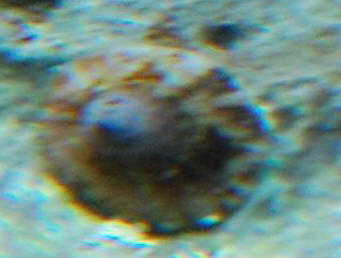 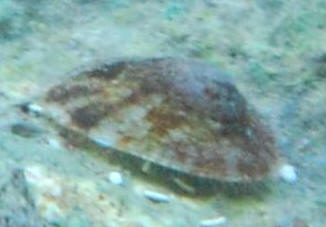 Thrummm! Thrummm!
|
|
|

